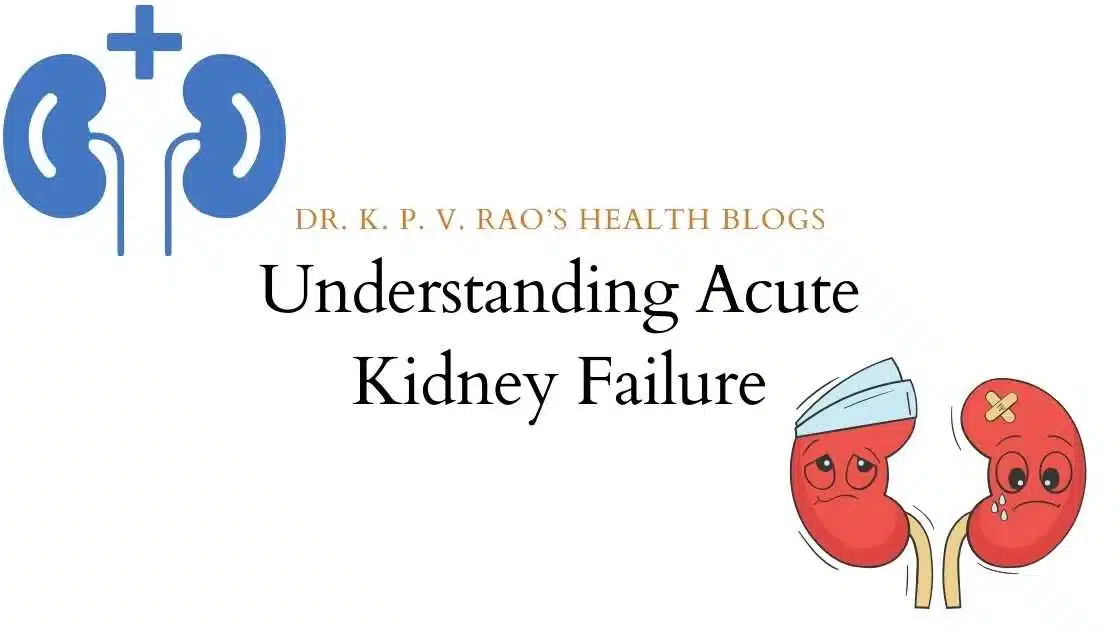Introduction
In the recent past, I have written posts on Chronic Kidney disease and Diabetic Nephropathy or Kidney disease. Now, in this article, we will discuss another kidney condition- Acute Kidney Failure.
Why am I writing this article
Are you aware of the dangers and implications of acute kidney failure? Acute kidney failure, also known as acute renal failure or injury, is a serious condition that can have severe consequences if not properly understood and treated.
Let me explain this with a real life example of a case of acute kidney failure.
Case Study
During my early medical college days, during the 1970s, one of my colleagues, who was also shared the same room with me at the hostel, was called home as an emergency.
What was this emergency? His 64-year-old dad had suddenly fallen sick with diarrhea and severe dehydration. He was admittted in a goverment hospital where he was put on treatment with drips of saline and glucose.
However, he had become critical because his kidneys had shut down due to dehydration. His serum creatine had shot upto 8m/dl [normal range-0.7 to 1.3] and blood urea nitrogen [BUN] had also shot up to 50 mg/dl [normal range- 8 to 20]. This condition required urgent dialysis and this facility was not available at that hospital. [ Read this article on GFR and Kidney Function Tests to know more]
This was a classic case of Acute Kidney Failure. Suffice it to say, my colleague’s father did not survive and he died in the hospital due to lack of facilities in the hospital.
Fortunately for us, today all facilities like urgent dialysis are available in most big hospitals and we can save patients if brought in, in time!
In this comprehensive article, we will explore the causes, symptoms, complications, prevention, and treatment strategies for acute kidney failure.
Because this article is quite exhaustive, I have split it into 2 parts. In today’s article we will learn all about the causes, symptoms and complications of this condition. In part 2, we will learn how to prevent and manage acute kidney failure.
What is acute kidney failure and why do doctors use the term kidney injury?

Acute kidney failure, also referred to as acute renal failure or injury, occurs when the kidneys suddenly lose their ability to function properly. This can happen within a matter of hours or days, and it is crucial to seek medical attention immediately.
The term “acute kidney injury” is often used by doctors to emphasize the fact that the kidneys are not functioning as they should, rather than a complete failure.
Factors leading to acute kidney failure
There are several factors that can lead to acute kidney injury. Physical trauma, such as a car accident or a severe blow to the abdomen, can cause direct damage to the kidneys.
Infections, like urinary tract infections or kidney infections, can also lead to acute kidney injury if left untreated.
Additionally, certain medications, such as nonsteroidal anti-inflammatory drugs (NSAIDs) or certain antibiotics, can have toxic effects on the kidneys and impair their function.
It is important to be aware of the potential risk factors and take necessary precautions to prevent kidney injury.
Causes of acute kidney failure
Acute kidney failure can be caused by a variety of factors, including:
- Physical injury: Any trauma or injury to the kidneys can result in acute kidney failure.
- This can include accidents, sports injuries, or other forms of physical trauma.
- Infections: Infections, particularly those affecting the urinary tract or kidneys themselves, can lead to acute kidney failure.
- Conditions such as urinary tract infections or pyelonephritis can cause inflammation and damage to the kidneys if left untreated.
- Medications and toxins: Certain medications, such as NSAIDs, antibiotics, and some chemotherapy drugs, can have harmful effects on the kidneys if not properly managed or if taken in excessive amounts.
- Additionally, exposure to certain toxins, such as heavy metals or solvents, can also cause acute kidney failure.
- Dehydration: Severe dehydration can lead to a decrease in blood flow to the kidneys, resulting in acute kidney injury.
- This can occur due to prolonged vomiting, diarrhea, excessive sweating, or inadequate fluid intake.
- Blood clots: Blood clots that block the blood vessels supplying the kidneys can cause acute kidney failure.
- This can happen as a result of conditions like deep vein thrombosis or kidney infarction.
- Kidney stones: Large kidney stones or a buildup of multiple smaller stones can obstruct the urinary tract, leading to kidney injury and potentially acute kidney failure.
- Autoimmune diseases: In some cases, autoimmune diseases like lupus or vasculitis can cause inflammation in the kidneys, leading to acute kidney failure.
It is important to note that these are just some of the potential causes of acute kidney failure. Each individual case may have unique underlying factors, and it is crucial to consult with a healthcare professional for an accurate diagnosis.
Symptoms of acute kidney failure
The symptoms of acute kidney failure can vary depending on the underlying cause and the severity of the condition. In some cases, the symptoms may be mild or subtle, while in others, they can be more pronounced. Common symptoms of acute kidney failure include:
- Decreased urine output: One of the hallmark signs of acute kidney failure is a decrease in urine production.
- This can be a significant decrease in the amount of urine passed, or a complete absence of urine.
- Swelling: Fluid retention and swelling, especially in the legs, ankles, and feet, can occur as a result of impaired kidney function.
- This is due to the body’s inability to effectively remove excess fluid and waste products.
- Fatigue and weakness: Acute kidney failure can lead to a buildup of toxins in the body, which can cause fatigue, weakness, and overall malaise.
- Shortness of breath: Fluid buildup in the lungs can cause difficulty breathing and shortness of breath.
- Nausea and vomiting: The accumulation of waste products in the body can lead to gastrointestinal symptoms such as nausea and vomiting.
- Confusion and mental fog: As waste products accumulate in the bloodstream, they can affect brain function, leading to confusion, difficulty concentrating, and even seizures in severe cases.
- Chest pain or pressure: Acute kidney failure can sometimes cause chest pain or pressure, which may be a sign of fluid overload or other complications.
If you are experiencing any of these symptoms, it is crucial to seek medical attention for a proper diagnosis. Your doctor will then carry out investigations to confirm renal failure.
Complications of acute kidney failure
Acute kidney failure can lead to various complications, which require immediate medical attention. These complications can include:
- Fluid buildup: Impaired kidney function can result in fluid retention, leading to swelling in the legs, ankles, and other parts of the body.
- If left untreated, this can cause shortness of breath and fluid overload, which can be life-threatening.
- Electrolyte imbalances: The kidneys play a crucial role in maintaining the balance of electrolytes in the body, such as sodium, potassium, and calcium.
- When the kidneys are not functioning properly, these electrolyte levels can become imbalanced, leading to muscle weakness, irregular heart rhythms, and other complications.
- Acid-base imbalances: The kidneys help regulate the acid-base balance in the body.
- When they are impaired, it can lead to an accumulation of acid in the blood, resulting in metabolic acidosis.
- This can cause symptoms such as confusion, rapid breathing, and increased heart rate.
- High blood pressure: Acute kidney failure can contribute to the development or worsening of high blood pressure, which can further damage the kidneys and other organs if not controlled.
- Infections: Impaired kidney function can make individuals more susceptible to infections, particularly urinary tract infections or kidney infections.
- These infections can further compromise kidney function and lead to additional complications.
- Cardiovascular complications: Acute kidney failure can increase the risk of cardiovascular complications, such as heart attack or stroke. This is due to the close relationship between kidney function and cardiovascular health.
- Chronic kidney disease: If acute kidney failure is not properly managed or treated, it can progress to chronic kidney disease, which is a long-term condition that requires ongoing medical care.
Here we come to the end of Part 1. As said above, we will learn the management of this condition in Part 2.
Do share this article if you have found it useful. You can also Click to Tweet below-
Understanding Acute Kidney Failure-Part 1 Share on XSuggested reading:




